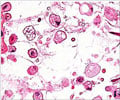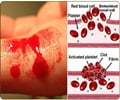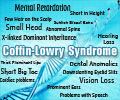X-linked intellectual disability is due to defective genes on the X-chromosome is mainly found in men and affects brain signalling pathways.

Women are affected only if both their X chromosomes carry the defective genes. Women with one healthy and one mutated X chromosome have a 50 percent chance of passing the mutated X chromosome on to their offspring.
The search for the responsible genetic defect was very tedious due to the high variability of the clinical picture.
Researchers have discovered changes in a number of genes that were already related to the disorder and mutations in seven other genes that were not associated with the disorder.
High-throughput sequencing allows sequencing of a large number of DNA segments simultaneously and identifies genetic defects. Scientists investigated all DNA regions of the X chromosome containing protein-relevant information.
"In addition to known disease-related genes, we have discovered seven novel genes as the cause of X-linked intellectual disability and analysed what signalling pathways in the cells each protein is involved in," said Kalscheuer.
Advertisement
Source-Medindia













